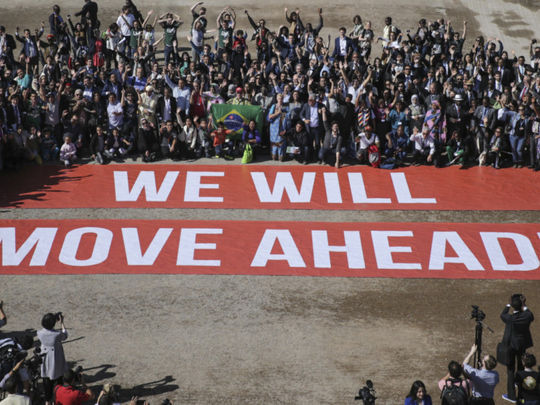
For anyone concerned about global warming, American President-elect Donald Trump’s victory seems like a complete disaster. He promised to crush United States President Barack Obama’s Clean Power Plan (CPP) and pull out of the international Paris Climate Agreement — twin pillars of US climate policy. Not only will American greenhouse-gas emissions be higher, other nations might respond by easing their climate plans, too, pushing emissions up further. After the decades of work it took to strike the Paris agreement, which is based on every major country committing to cooperate, the international climate effort is in peril.
But when I met with Mutsuyoshi Nishimura, a veteran Japanese climate negotiator and high government official, one of the first things he wanted to ask me about following Trump’s victory was an obscure policy in the federal tax code.
Foreign climate diplomats such as Nishimura are sophisticated observers of American politics. They have known for years that if a Republican succeeded Obama, the US might renege on its international commitments and attempt to scrap the high-profile domestic climate policies that the Obama administration had spent years crafting. The US had burned the international community once before; global negotiators worked with former vice-president Al Gore to build the Kyoto Protocol, the world’s previous attempt at a big international climate agreement, only to see former US president George W. Bush reject it when he came into office.
That is why Nishimura wanted to know about the tax code. American officials, Nishimura said, assured international negotiators that, as long as two tax provisions remained in force, the US could meet much of its Paris pledge to cut emissions 26 to 28 per cent below 2005 levels by 2025. These sections, known as the Production Tax Credit and the Investment Tax Credit, directly subsidise wind and solar energy projects in the US. Elements of the production credit have been part of the country’s energy plan since 1992 and the subsidies have powerful backers in both parties.
A drive through rural Iowa shows why many Republicans, who are typically hostile to the environmental left, defend these subsidies: Their constituents profit from renting sections of their property to wind companies. Tall, white turbines often define the landscape in ultra-conservative western Iowa and elsewhere in the wind-rich Midwest. Other places, too: Texas is the largest wind producer in America.
Last year, US Congress extended the subsidies. Though lawmakers also scheduled them to phase down over time, popular tax breaks have a way of sticking around. Even if they phase out as planned, experts project they will result in large-scale installation of new renewables capacity over the next several years, after which renewables technologies may be cost-competitive without the tax breaks. This sort of progress would not be enough in the medium or long-term, during which fossil fuel power plants must be aggressively retired and replaced. But the subsidies would at least have significant effects over the next four years of a Trump administration.
Like a lot of policy that attracts bipartisan backing, the subsidies are not particularly elegant. They crudely throw cash at renewables without prioritising projects that would be the most useful. But at this point climate wonks may have to take what they can get: The subsidies provide some hope that the United States will not take a massive step back on the climate.
Nishimura added that if Trump uses some of the money he wants to spend on infrastructure to improve electricity transmission lines, he would remove a major barrier to new renewables coming online. Even if that does not happen, state and local climate policies will survive Trump, as will federal regulations the courts will not let him destroy.
Nishimura also warned, however, that the Trump administration may undermine the global climate effort in ways many are not considering now. Trump, he said, may try to “destroy the science”. The United Nations’ Intergovernmental Panel on Climate Change, the keeper of the consensus on climate science, relies on the good intentions of various governments to produce its authoritative reports. “It’s easy for Donald Trump to order Ambassador John Bolton to go there and change all these things,” he said. “There are lots of sceptics, particularly in the Anglo-Saxon world,” as well as Japan, he explained. “They would be animated, they would be emboldened.”
Nishimura admitted that would lead to a massive international backlash against the US, but he also argued that America may be in store for that, anyway. Even if the US largely meets its emissions pledge, acting on Trump’s explicit promises to stick a thumb in the eye of the international community will bring costs — particularly when it comes to who is seen as acting in the common interests of the planet. “Another reality President Trump will face when visiting Paris, visiting Frankfurt, he will have huge demonstrations,” Nishimura said. Moreover, “China will seek, in my view, the moral high-ground and declare themselves the top world leader for the planetary environment,” he said. Countries that behave as Trump proposes will be blamed internationally “as a spoiler of pristine planetary civilisation”.
Some have argued that global outcry may convince Trump to take a softer line on climate in the coming years. So far, the US President-elect is not sending signals that he intends to back down. His transition chief on environmental policy is a famous climate change sceptic. If that is any indication, we had better hope Nishimura is right to place trust in the climate policy that might survive the Trump administration — and that it helps convince other countries to keep moving in the right direction, too.
— Washington Post
Stephen Stromberg specialises in US policy and politics, covering elections, the White House, Congress, legal affairs, energy, the environment and health care.








